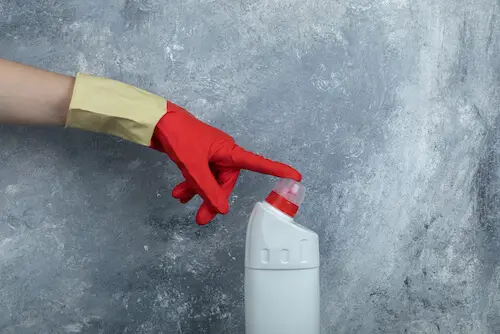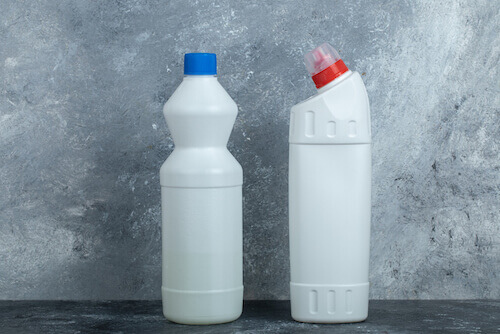When it comes to cleaning your home, you may be wondering if bleach is flammable.

Have you ever wondered if bleach is flammable? You’re not alone. Many people don’t know whether or not bleach can ignite and start a fire.
In this post, we’ll explore the answer to that question and share some safety tips for using bleach around your home.
Stay safe!
Is Bleach Flammable?
Common bleach is not flammable and cannot be ignited by a flame or spark. With that said, if you mix bleach with some other common items found around the house, it can become flammable.
Safety Tips for Handling Bleach Around Your Home
Mixing bleach and ammonia creates a toxic gas which has no color and has a sharp odor that is easily detectable. Avoid using these chemicals in areas where they will be exposed to open flames.
Mixing bleach with other common cleaners, including vinegar, can create flammable gas which is heavier than air. This means it will tend to settle in low spaces around your home where it can be dangerous if exposed to flames or sparks.
Be sure all bleach containers are tightly sealed when not in use to avoid any accidental mixing of chemicals that may cause a dangerous gas to form.
Be aware that bleach will not evaporate quickly. If you pour bleach on the ground, it can take days for it to completely disappear, so avoid using excess amounts of bleach to clean areas outside your home.
What about Bleach and Fire?
Mixing bleach with other cleaning products, flammable liquids or oil products, or combustible materials can be dangerous and there’s always a risk that flammable gas may form. In addition to the fire hazard, mixing bleach with other cleaners can lead to toxic fumes being released into your home.
If you must mix bleach with an oil-based product such as a degreaser for cleaning purposes, make sure you are in a well-ventilated area and avoid using it in an area where the fumes can build up.

Bleach should never be mixed with acids, alcohols or other common household chemicals due to its corrosive effects.
If you use bleach when cleaning your home, make sure it’s well ventilated, store all containers carefully to prevent spills and never use bleach with other chemicals or cleaners that can mix to create fumes or gas.
What Type of Bleach Is Most Flammable?
It’s best to use household bleach that contains sodium hypochlorite as the active ingredient.
Chlorine bleaches are less likely to start a fire. However, in extremely rare cases, these types of bleach can still catch fire if higher concentrations are used.
In addition, any type of bleach may have additives, such as sodium hydroxide, which can cause it to combust.
How Can You Reduce the Risk of Combustion?
You should take steps to reduce any risk to yourself and the people around you when cleaning with bleach around your home.

Bleach is safe when diluted in water and shouldn’t ignite if it comes into contact with flames, but precautions should always be taken.
1. Use water to dilute bleach before using it on any other cleaning products or surfaces around your home.
Avoid dry mixing other types of cleaners with bleach to prevent an accidental chemical reaction. Ensure you’re working in a well-ventilated area when using multiple chemicals around your home.
2. Store your bleach in a dry, high place where children and pets can’t get to it. If you’re storing bleach for an extended period of time, keep the container tightly sealed to prevent fumes from forming or gas that could ignite.
Never leave empty containers lying around; empty bleach containers are still dangerous if exposed to heat or flame.
3. Do not mix bleach with other chemicals, especially flammable ones like gasoline or kerosene. If you must use bleach to clean oil-based products, make sure you are using it in a well-ventilated area.
4. Wear protective clothing when working with bleach to avoid skin contact. Rinse any spills immediately with water.
5. Never pour bleach directly on a surface or into a sink. Use a spray bottle or other type of gentle applicator to apply the bleach, and immediately wipe up any spills with water.
6. Keep an eye on barbeque areas when cooking near your home. If you notice any fumes, ensure the area is well-ventilated and move indoors .
7. If fire starts, close doors to stop fumes spreading through your home. Never attempt to fight the fire yourself – unless you are trained to. Leave immediately and call the emergency fire responders instead.
8. Keep all bleach containers labeled with their original contents for easy identification in an emergency. When mixing household cleaners, wear protective clothing, gloves and eyewear to avoid any unwanted exposure to flammable chemicals.
What About Combining Bleach with Other Cleaning Products?
Household bleach should never be mixed with other cleaning products or acids, because it can cause toxic gas to form.
Mixing chlorine bleach with vinegar or ammonia may also create poisonous fumes due to the reaction betweenthe chemicals.
Suggestions for using bleach: Use water to dilute before using on any other cleaning products or surfaces around your home. Store in a dry, high place where children and pets can’t get to it. Keep an eye on barbeque areas when cooking near your home. If fire starts, close doors and call the fire department .
Final Thoughts
Bleach is a chemical that can cause problems in small quantities, but when used safely it doesn’t present any major safety concerns.
However, when mixed with other chemicals or cleaners, bleach may become flammable and lead to toxic fumes being released into your home.
If you have children or pets in your household, it’s important to keep bleach stored high up out of reach, where it’s difficult for them to access.
It’s also essential that you avoid mixing bleach with other chemicals, especially flammable ones like gasoline or kerosene. If you must use bleach to clean oil-based products, make sure you are using it in a well-ventilated area.
